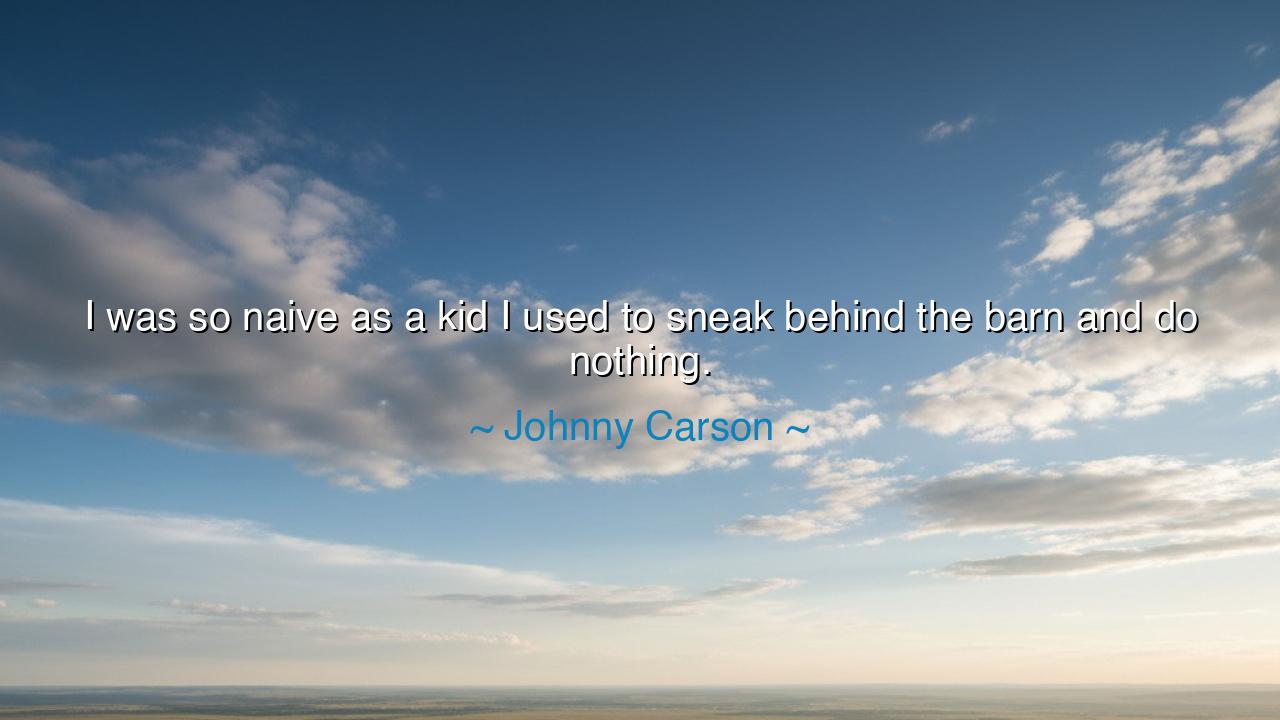
I was so naive as a kid I used to sneak behind the barn and do






“I was so naive as a kid I used to sneak behind the barn and do nothing.” — thus jested Johnny Carson, a master of laughter whose humor carried beneath it a whisper of truth. To the inattentive ear, this quote may seem but a playful memory, a line crafted to entertain. Yet beneath its mirth lies a tender reflection on innocence, on the purity of a heart untouched by guile, and on the strange beauty of doing “nothing” in a world that demands constant doing. It is a remembrance of a time when naivety was not weakness, but wonder — when the mind had not yet learned deceit, and the soul rested easily in its own stillness.
In the ancient days, the sages spoke often of simplicity as the highest wisdom. Lao Tzu said that “the sage does nothing, yet leaves nothing undone.” To “sneak behind the barn and do nothing,” in the eyes of the ancients, would not be foolishness but a hidden wisdom — a child’s instinctive communion with the eternal quiet that underlies all things. In his naivety, the child Carson did what philosophers strive for all their lives: he touched the stillness of being without needing a name for it. What he calls “doing nothing” may have been, in truth, the first brush of meditation — the silent wonder of simply existing.
But as we grow, the world teaches us to scorn such stillness. We are told to hurry, to achieve, to fill every silence with sound, every moment with motion. The innocent stillness of youth becomes the restless hunger of adulthood. We no longer sneak behind barns to wonder at the sunlight or listen to the hum of the earth. Instead, we chase ambitions that make us forget the simple glory of just being alive. Johnny Carson’s humor is thus bittersweet — for in his joke lies the unspoken loss of that childlike simplicity, replaced by the ceaseless motion of grown life.
Consider the story of Siddhartha Gautama, the prince who would become the Buddha. Surrounded by every luxury, he was kept from suffering and from stillness. Yet one day, weary of endless pleasure and constant doing, he sat beneath the Bodhi tree and vowed not to move until truth revealed itself. There, in stillness — in “doing nothing” — he found the meaning of all existence. Like Carson’s child behind the barn, he stepped away from the noise of the world, and in silence, he discovered eternity.
The world mocks the naive, but wisdom hides within them. For the naive are not yet armoured with cynicism; they still see the world as new. They can laugh at their own foolishness and still find joy in it. In every soul that dares to be “naive,” there is a spark of courage — the courage to be genuine in a world that pretends. Carson’s remark reminds us that innocence is not ignorance, but openness: the heart’s ability to be at peace even when doing nothing.
So let us not rush to outgrow our naivety. Let us reclaim it, refine it, and let it guide us. Go behind your own barn — wherever that may be — and allow yourself moments of nothingness. Sit quietly beneath a tree, or watch the clouds pass without counting the time. In these moments, you will meet yourself again, the child who once existed before ambition or fear. From such stillness, great strength arises — the kind that acts without hurry, loves without demand, and lives without regret.
For the great paradox of life is this: the wiser we become, the more we return to the innocence we began with. To “do nothing” is not laziness, but the secret rhythm of the soul in harmony with the universe. The child behind the barn, unaware of his wisdom, was already in the presence of eternity. And so, O reader, remember — amid your work and striving, find time to do nothing. For in the stillness of your heart, you will find not emptiness, but the boundless peace that only the truly innocent can know.
Thus, Johnny Carson’s laughter becomes a lesson: cherish your naivety, honor your stillness, and never be ashamed of simplicity. For in a world that measures worth by motion, the bravest act may yet be to sit quietly — behind the barn — and let your soul breathe.






AAdministratorAdministrator
Welcome, honored guests. Please leave a comment, we will respond soon